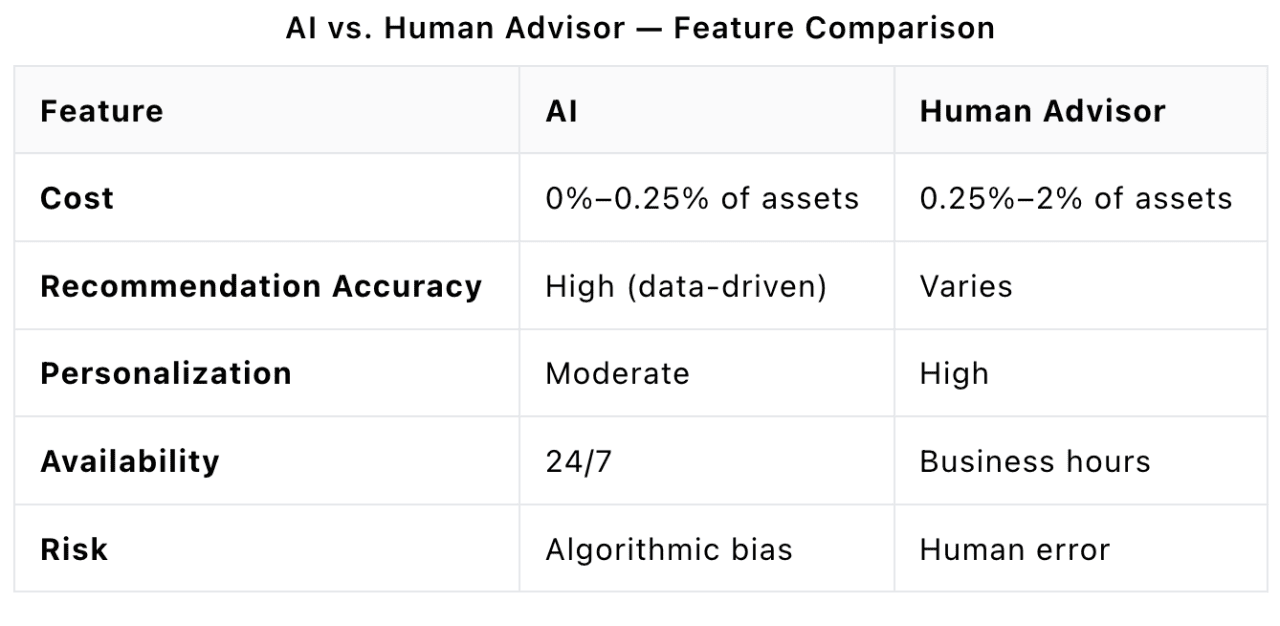The pros and cons of using AI to manage your finances

fizkes // Shutterstock
The pros and cons of using AI to manage your finances
Managing your finances can feel like a full-time job. Thankfully, with the help of artificial intelligence (AI), managing your finances is faster and easier than ever—from setting goals and tracking expenses, to building better saving plans.
Artificial intelligence is the engine powering many of the financial tools on the market. Wealth Enhancement explores how AI in finance works, the benefits it may bring, and the risks to watch out for.
What Is AI and How Is It Used in Finance?
Artificial intelligence refers to machines that can think and make decisions independently. In personal finance, AI can help analyze information, like how much money you’re making and how you’re spending it, and help you make smarter decisions.
AI in financial services is everywhere:
- AI budgeting tools that monitor and categorize your spending
- Robo-advisors that can help with investment decisions
- Chatbots that give quick advice on money matters
- Fake money detectors that can prevent theft, scams, or other fraud
Some AI tools can help you track your spending and stay on budget in a fun, easy way, while robo-advisors may look at your risk and goals to help grow your money with simple, clear advice.
AI in finance is quickly becoming personal, practical, and powerful. In fact, research from credit giant Experian shows that nearly half the people surveyed (47%) have or are considering using generative AI-powered tools to help manage their finances. A large swath of younger generations is also embracing technology, with 67% of Gen Zers and 62% of Millennials stating they use technology to manage their finances.
Pros of Using AI in Financial Management
One major advantage of using AI is how it simplifies financial planning. It does not matter whether your goal is to save for a vacation or retirement, AI can help track your progress and keep your finances in check. Some advantages include:
Increased Efficiency and Automation
AI tools can save time by automating your routine activities: paying bills, monitoring expenditures, and even tracking investments.
AI Advisors Cost Less
Fees can vary widely between services, but generally, robo-advisors are less expensive than their human counterparts. Robo-advisor fees range from 0% to 0.35%, with traditional financial advisors charging somewhere between 1% and 2% for assets under management.
It should be noted that human advisors are getting more diverse in their pricing practices, offering fees tailored to their clients. Envestnet has an article on the various fee models available that shows how human advisors are evolving the pricing on their services.
Improved Accuracy in Budgeting and Forecasting
AI can examine historical financial trends and attempt to forecast future results. Some apps can analyze your spending in a month and alert you when you are about to exceed your spending limit or allow you a budget alternative.
Personalized Financial Insights
Compared to traditional software, AI tools can learn according to your individual goals. With an AI chatbot, you can brainstorm monthly budgets, review purchases you made, or even come up with a savings plan.
24/7 Access to Financial Support
24/7 support is one of the major benefits of AI in the financial sphere, giving you access to customer support any time, day or night.
Cons of Using AI in Financial Management
AI can be useful, but it is not flawless. Here are a few reasons to be cautious while using AI to manage your finances:
Data Security and Privacy Concerns
The majority of AI tools need access to sensitive financial data. Without proper protection, your personal data may fall into the hands of hackers or be used in other harmful ways.
Lack of Regulation
AI advisors aren’t held to the same standard as fiduciary financial advisors, and as of now, can’t be held liable for the advice they provide.
When You Need More Than Numbers
AI can process data, but it doesn’t feel emotion. Life’s biggest financial decisions, like protecting your family or planning for a legacy, are about more than algorithms. That’s where a real advisor makes a difference with empathy, experience, and a personal touch that understands your family’s unique story.
Overreliance on Technology
Using an app to manage your finances can be very tempting to depend on. This could, however, result in the absence of financial awareness or understanding. It is always good to double-check what the tool is doing on your behalf.
Potential for Bias in Algorithms
AI is trained using data, and when this information has bias in it, so can the results. It implies that certain tools may yield inaccurate or unjust suggestions found on a faulty basis.
AI vs. Human Financial Advisors
For beginners, robo-advisors with low fees may be attractive options, but as a person’s financial situation gets more complicated, the empathy and nuance of human advisors become more valuable.

Wealth Enhancement
FAQs About Using AI to Manage Finances
Can AI help manage finances?
Yes. AI can help manage finances by automating tasks like budgeting, retirement planning, account monitoring, and expense tracking. It provides insights through data analysis, helping people make smarter financial decisions with greater efficiency and accuracy.
Which AI is best for personal finance?
There isn’t a single “best” AI for personal finance, as it depends on your goals, preferences, and desired features. Popular AI-powered tools include budgeting apps, robo-advisors, and investment platforms. The right choice depends on whether you prioritize savings, retirement planning, or advanced portfolio management.
Does using AI save money?
AI can save money by reducing errors, improving efficiency, and optimizing financial planning. However, it doesn’t fully replace human knowledge. Without a financial advisor’s personal guidance, some opportunities for growth or risk management may be missed.
How is AI impacting finance?
AI is reshaping finance by driving smarter investments, enhancing risk management, and improving banking services. Financial institutions use AI for fraud detection, compliance, and customer service. Overall, AI is making finance more efficient, personalized, and secure.
What are the benefits of AI in finance?
The benefits of AI in finance include:
- Greater efficiency and automation
- Improved fraud detection and security
- More personalized financial planning and advice
- Better customer experiences
- Increased profitability for institutions and investors
What are the risks of AI financial tools?
While AI offers many advantages, it also carries risks, including:
- Bias in decision-making and lack of transparency
- Security and privacy concerns
- Fraud and misuse of sensitive data
- Over-reliance on technology without human oversight
- Ethical and regulatory challenges
- Job displacement in financial services
Final Thoughts
The world of money management is changing fast, and using AI to manage your finances is no longer just for techies. From daily budgeting to long-term goals like managing retirement accounts, AI can make financial management more accessible to everyone.
AI is helpful, but what truly makes the difference is a real financial advisor who understands your long-term goals and can guide you with advice that fits your life.
Content in this material is for general information only and not intended to provide specific advice or recommendations for any individual.
This story was produced by Wealth Enhancement and reviewed and distributed by Stacker.
![]()



